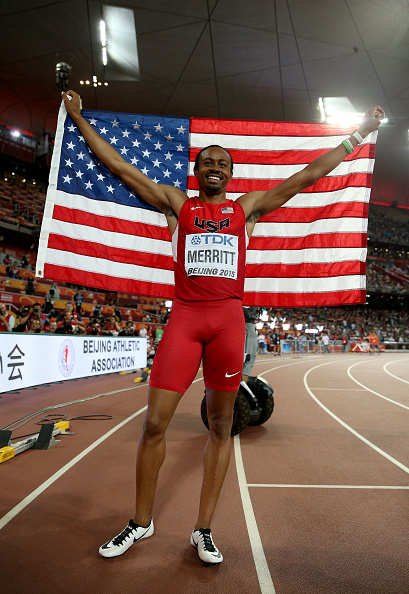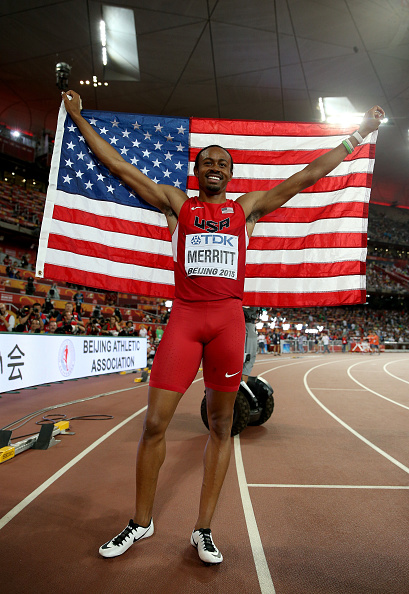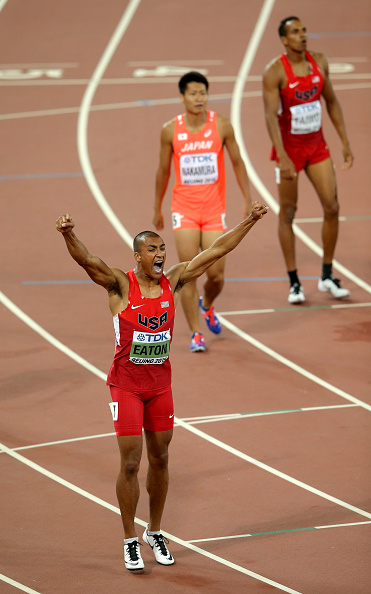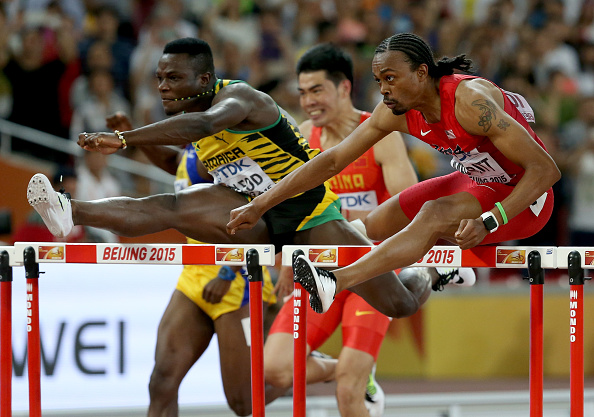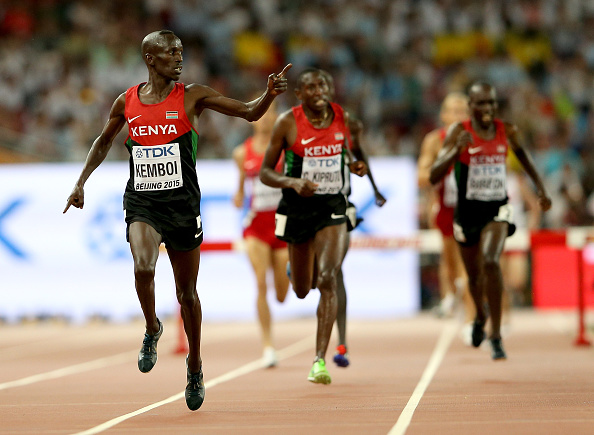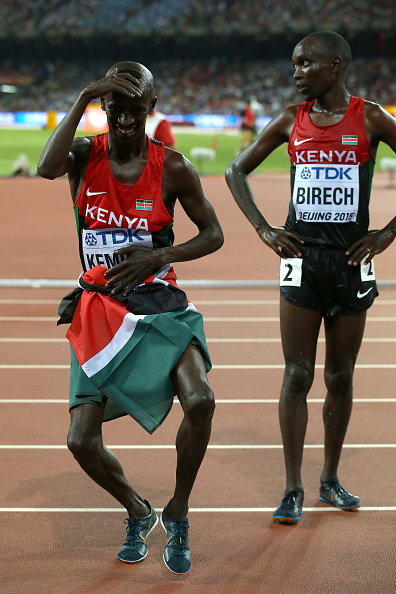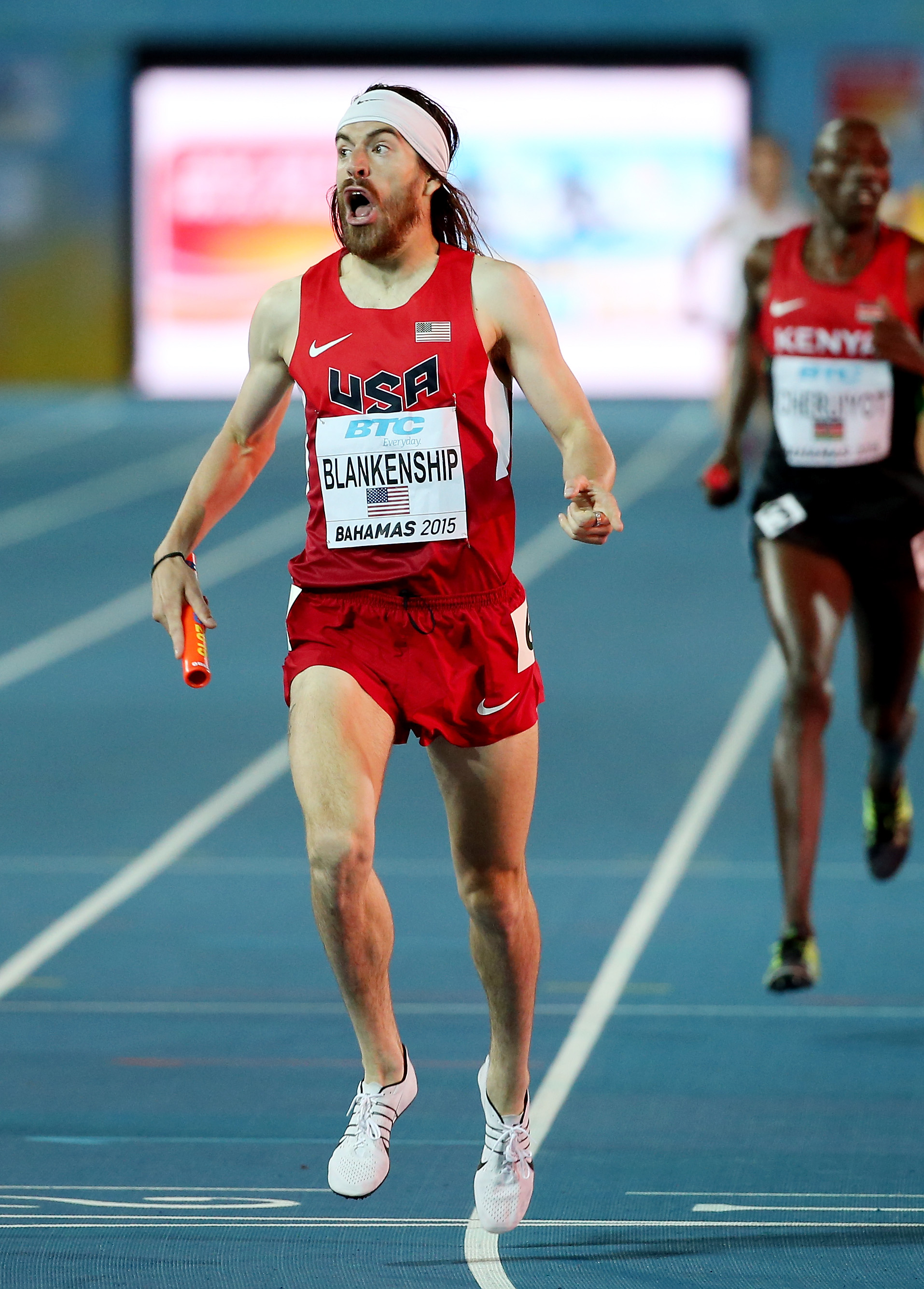BEIJING — These 2015 world track and field championships at the Bird’s Nest drew more than 1,900 athletes from more than 200 nations.
Every single one of them has a story. But no one has a story quite like Aries Merritt, your 2015 110-meter hurdles bronze medalist. In just a few days, he's going to have a kidney transplant.
Merritt, the 2012 Olympic 110 hurdles champion as well as the world record-holder, 12.80 seconds, run in Brussels that same Olympic year, took third in the 110 final Friday night, in a season-best 13.04.
Sergey Shubenkov of Russia ran a national-record 12.98 for the win. Jamaica’s Hansle Parchment took second, in 13.03.
This coming Tuesday, back in the United States, Merritt is due to have a kidney transplant. His sister, LaToya Hubbard, is to provide the donor kidney.
"I feel like my bronze medal is a gold medal, to be honest," Merritt said.
Also Friday, the American Ashton Eaton ran a ridiculous 45-flat in the 400 to top off his first day of the two-day test that is the 10-event decathlon. That’s a world record for the decathlon 400; Bill Toomey had run 45.63 in 1968.
That 45-flat would have gotten Eaton seventh in the open 400, won Wednesday night by South Africa's Wayde Van Niekerk.
After Day One, Eaton has 4703 points. He is on pace to break his own world record in the decathlon, 9039 points, set at the 2012 U.S. Olympic Trials.
In the women's 200, Dafne Schippers of the Netherlands, a former heptathlon standout, raced to the win in a 21.63, a world championships record.
Only Florence Griffith-Joyner and Marion Jones have run the women's 200 faster. Flo-Jo ran 21.34 and 21.56 at the 1988 Seoul Olympics; Jones' 21.62, run in 1998, was done at altitude, in Johannesburg.
"I know I'm clean and I know I work very hard for it," Schippers said afterward when asked about the other two.
Asked if she envisioned ever going back to the heptathlon, Schippers laughed and said, "I don't think so."
Jamaicans Elaine Thompson, in 21.66, and Veronica Campbell-Brown, in 21.97, went 2-3.
Just before these championships got underway last week, Merritt disclosed — in a story posted on the IAAF website — that he suffers from a rare genetic disorder found predominantly in African-Americans.
His condition was aggravated by a virus that had attacked his kidneys and, as well, his bone marrow.
Kidney function, he said, is down to under 20 percent. That's both kidneys. He said late Friday, "They’re not filtering properly. They don’t work."
Earlier this week, he had told reporters, “Just to be keeping that secret, it felt like a weight had been lifted when I was able to share it.
“The positive outreach has been amazing. I love running, I love competing. This is my life and here I am.”
Pause for just a moment. Think about all this.
That Merritt is here is, in the first instance, remarkable.
That he made the final all the more so, winning his semifinal Thursday night, in a then-season best 13.08.
That he won a medal — a testament to his considerable will.
“I am only 75 percent physically healthy,” Merritt had said after the semifinal. “That should be enough to give me a medal."
Seriously? For real: "I am still keeping it smooth. For the final there is nothing I want to change. I want to stay consistent. My rhythm is coming back — I am glad that it is coming back for the world championships.”
The sprint hurdles make for some of the great, truly great, races on the track and field program. Anything can happen, and often does.
The Americans had been expected to dominate both the men's 110 and women's 100. Didn't happen.
In the first women’s 100 semifinal Friday, for instance, the American Dawn Harper-Nelson crashed into the second hurdle and down to the track, rolling into the third hurdle; she is the Beijing 2008 gold and London 2012 silver medalist. She walked away, apparently unhurt.
For the record: Dawn Harper-Nelson is one of the classiest acts in track and field. This is what she said afterward: “I am sorry I let people down.”
In the next semi, another American, Kendra Harrison, was disqualified for a false start. She was not happy about it, and took a good long time leaving the track.
In the final, here was the finish, a result absolutely no one could have predicted:
Jamaica’s Danielle Williams with a personal-best 12.57 for the win, Cindy Roleder of Germany a personal-best 12.59, two-hundredths back, and Alina Talay of Belarus in third with 12.66, another national record.
The defending champion, American Brianna Rollins, finished fourth, in 12.67.
"The last years, you saw the trend," with Americans expected to dominate the women's sprint hurdles, Talay said, adding, "It was really tough to fight against them. You can see that European girls can do that, and we proved that today."
"And Caribbean girls," Williams said.
The men’s 110, particularly over the past few seasons, has been that singular event in which the top competitors in the world line it up and race each other, meet after meet.
By contrast, Usain Bolt and Justin Gatlin had not run against each other in the sprints — with the exception of the World Relays in the Bahamas this past May — since 2013. And in that relay, Gatlin ran the second leg for the U.S., Bolt the anchor leg for Jamaica.
Bolt, in a news conference Thursday night after winning the 200, Gatlin taking second, just as they had done in the 100 Sunday night, noted that he had been injured for most of 2014 and had to work himself back this year back into winning form.
“People were saying I was ducking Justin Gatlin most of the season,” he said, demurring, “It makes no sense to compete when I’m not at my best and Justin Gatlin is at his best. I’m going to lose.”
The first 110 world record, 15 seconds, dates to 1912. The benchmark now for a championship performance is 13 seconds, or under. Since they have been keeping records, before Friday night only 18 guys had gone sub-13.
Shubenkov makes it 19.
Three years ago, at his best, Merritt was essentially unbeatable. He won in London in 12.92 — after running 12.93 three times in a row before that, including at the U.S. Olympic Trials.
About a month after the Games, on September 7, 2012, Merritt ran that 12.80 in Brussels — his form and fluidity a thing of beauty whether you are a hard-core track fan, or just casually dropping in.
In that race, Merritt dropped seven-hundredths of a second off the standing world record, 12.87, which Dayron Robles of Cuba had run in 2008. It made for the record’s largest single time drop since 1981, when the American Renaldo Nehemiah became the first guy ever to run under 13; he went 12.93, cutting seven-hundredths off his own mark, 13-flat, which he had run two years before.
The next year, Merritt ran much, much slower.
After the 2013 world championships in Moscow — he finished sixth in the high hurdles — Merritt checked into the emergency room at the Mayo Clinic in Arizona.
That was October.
He didn’t leave the hospital until the next April.
The first concern was treating the virus. After that, the doctors’ focus was his kidneys.
"When they told me I'd never run again, my whole world ended in my mind," he said.
The condition, Merritt said, is called "collapsing FSGS," for "focal segmental glomerulosclerosis." He is obviously thinner than he was three years ago -- six pounds, he said. Too, he has undertaken a significant lifestyle change -- he can't process potassium so he can't, for instance, drink orange juice.
"It has been a struggle," he said Friday night. "It has been very tough for me these last couple years. Just to be here at these world championships shows I’m mentally tough and I have the heart of a champion."
In May 2014, Merritt showed up again to race. Again, the month before, he had been in the hospital. He ran 13.78 at the Steve Scott Invitational in California.
At the end of the summer of 2014, back in Brussels, he finished seventh in the Diamond League final. He said he was thrilled.
This year, he ran 13.12 at the Prefontaine Classic, in Eugene, Oregon, as May turned to June. A few weeks later, at the U.S. nationals, he qualified for the worlds by finishing third, in 13.19, behind David Oliver and Ronnie Ash.
Oliver had eased into Friday’s final with a 13.15 in the heats, 13.17 in his semi.
Ash never made it out of the start in the rounds. He flinched, according to the electronic timing system, and was DQ’d. Like Harrison Friday night, Ash did not think he had flinched. As the official IAAF report would later note in a delicate reference, “The American was not too happy at the decision and several minutes of confusion ensued before he finally left the track.”
Merritt went 13.25 to win his heat. Then, again, 13.08 for that win in the semis.
In the final, Oliver hit the first hurdle and got knocked out of rhythm. He finished seventh, in 13.33.
From that first hurdle, the race was clearly between Shubenkov, Parchment and Merritt.
Shubenkov, who is completely fluent in conversational English, said afterward, "It was a little bit of a surprise for me. It’s not every day a guy from Russia goes and wins the world championship in the hurdles and goes sub-13."
Both he and Parchment expressed admiration that someone in Merritt's condition could run, much less make the podium at a world championships.
"I still can not imagine how this is possible," Shubenkov said, adding a moment later, "Just now I learned he has such a severe condition. It's just, I don't know, beyond my realization. I can't think about it -- how it's possible."
Parchment: "I think he’s a very strong guy. To be here still competing … it’s really great, and i congratulate him on getting a medal here.
"I hope," he also said, "his surgery will go well and we will see him next year … in Rio."

